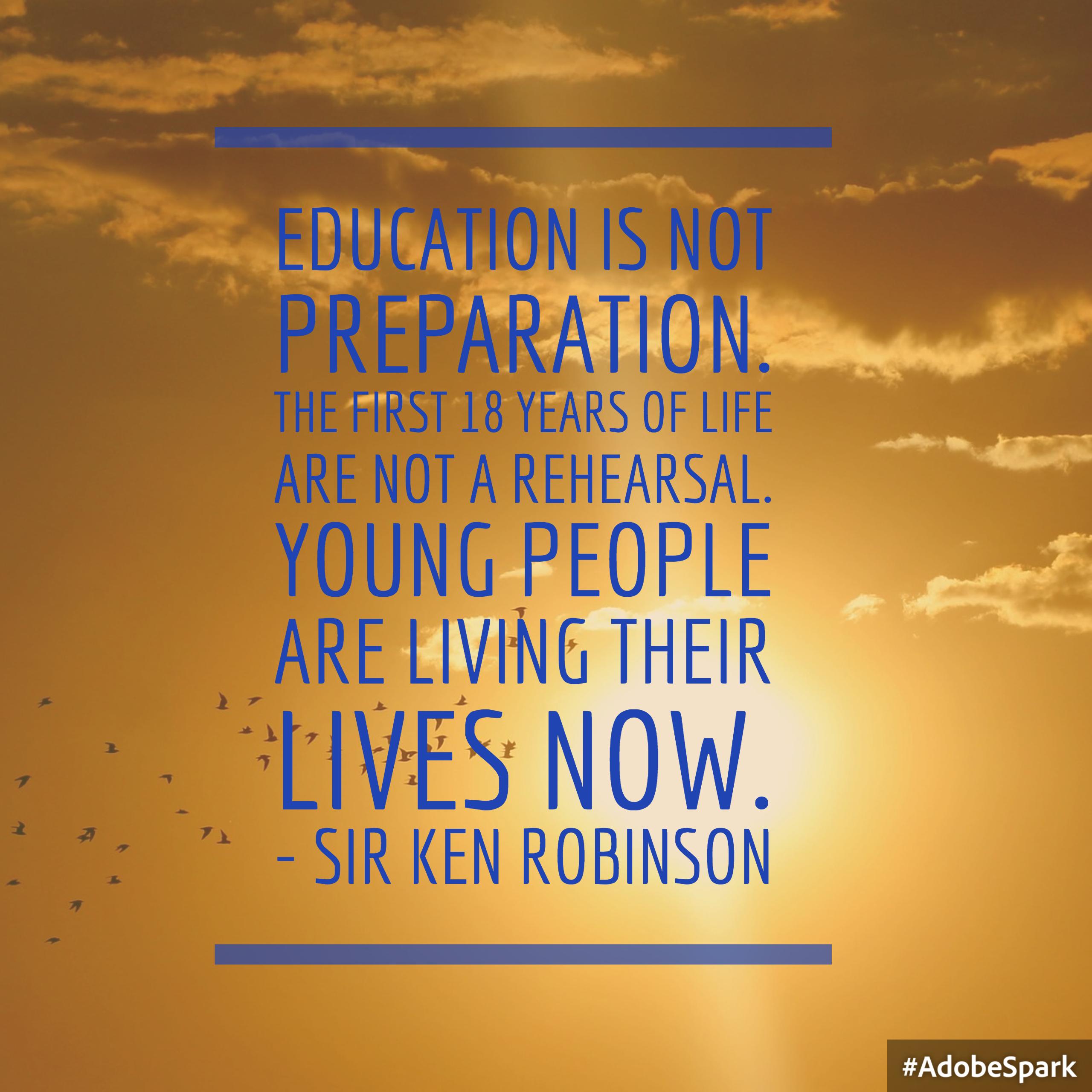Innovation as George Couros defines it in the Innovator’s Mindset is a way of thinking that creates something new and better.
So why is innovation necessary in education? There is wide agreement that we need to rethink the outdated factory model of education to meet the needs of all learners in our schools. Increasing access to information and the ability to network and share ideas demands that educational institutions are reimagined to ensure learners thrive in our rapidly changing world. In their book, Most Likely to Succeed, Tony Wagner and Ted Dintersmith paint a bleak picture of what is at stake if we don’t dramatically change our education system.
“Our country may continue to stumble from education reform to education reform like a drunken sailor. In the process, we’ll continue churning out millions of students each year with no real skills and no fighting chance in life. We’ll prioritize measuring irrelevant things and drill innovation and creativity out of our youth. A small number of our most talented will will escape the damage of school and go on to create successful companies and unimaginable wealth. Our wealthiest parents will continue to get kids into top colleges, arrange the “right” internships, and–despite education’s failings– help their advantaged kids pull ahead. The rest will plod through enervating school years, leave with abysmal career prospects, and have citizenship skills no better than mob psychology. As the ranks of chronically unemployed youth swell, the rift between the unrelenting rich and the disenfranchised rest will rip our society apart. We will fail as a country, not because other nations defeated us but because we defeated ourselves.”
This push for authentic, personal learning isn’t new; many have long advocated for learner-centered, constructivist approaches in education but these models have too often been the outliers rather than the norm and that will no longer suffice.
Current predictions are that almost two thirds of the jobs that today’s students will hold do not currently exist. We cannot prepare students for these careers that don’t yet exist, we must equip them to be able to adapt and work in a world that is complex and dynamic. We innovative educators that can evolve with the resources that exist to meet the needs of the learners in our schools.
Where are we going
We are at a critical juncture where our citizens and workforce, and our future prosperity, is predicated on our ability to build stronger connections to the life, work, and citizenship to the learning goals and experiences in our schools. Educators need to better understand and attend to the misalignment in the workforce job skills and our educational system that leave over half of college graduates to be under-employed or under-qualified for their jobs.
The Future of Jobs Report describes the urgency to to prepare future workers for the not so distant future. “The talent to manage, shape and lead the changes underway will be in short supply unless we take action today to develop it. For a talent revolution to take place, governments and businesses will need to profoundly change their approach to education, skills and employment, and their approach to working with each other.”
According to the report, the skills that will be in high demand by 2020 are:
- Complex Problem Solving
- Critical Thinking
- Creativity
- People management
- Coordinating with Others
- Emotional Intelligence
- Judgement and Decision Making
- Service Orientation
- Negotiation
- Cognitive Flexibility
The world of work demands individuals embody these skills but our actions in schools still rely on antiquated policies, procedures, and structures which have prevented us from aligning a vision that creates the desired culture and experiences. It’s critical that we rethink why, what, and how we learn in schools for students to thrive in the information economy of today and tomorrow, not yesterday.
Moving Forward
More teachers today are providing opportunities for their students to connect and learn in powerful ways. There is an increasing focus on competency-based learning, use of open resources, personal learning. These shifts are accelerated by access to technology that has transformed how we learn. However, making these shifts equitable across countless classrooms is more than purchasing technology or creating creative learning spaces. In order to reimagine classrooms and to leverage technology, educators need opportunities to develop new skills, knowledge, and dispositions to create opportunities for deeper learning that align with the world we live in.
With complex change, there is no one “right” answer because each context is different and has unique strengths and challenges. To create the opportunities for learning and innovation, leaders must engage diverse stakeholders, ask questions to understand the needs in their community, and empower people to figure out how to solve challenges they face. In the next 6 weeks we will be connecting educators around the world in the Innovator’s Mindset #IMMOOC to discuss and learn about new ideas, shift thinking and ultimately create new and better opportunities for the learners we serve.
George Couros highlights in the Innovator’s Mindset, “Often the biggest barrier to innovation is our own way of thinking.” I am looking forward to hearing new ideas from educators around the world to expand my own thinking. We hope you join us!



I am writing in the margins of your post with Hypothesis. Come join me.
https://via.hypothes.is///katielmartin.com/2016/09/13/is-innovation-in-education-necessary/
Kevin
Very thought provoking and really made me think of the things we do every day and how are they helping prepare students for these future jobs.